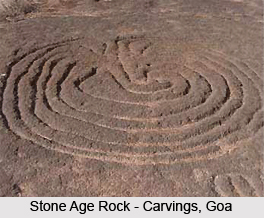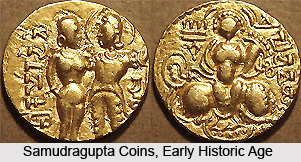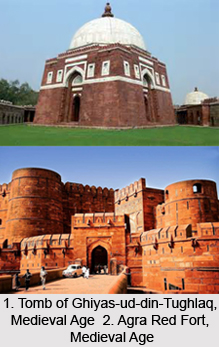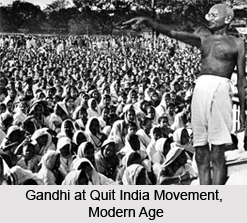 History of India is believed to be amongst the grandest epics of the world history which dates back to ancient periods, nearly above 75, 000 years ago, which has witnessed the existence of Homo sapiens or the human race, as per historical evidence. The oldest human civilization in the country is the Indus Valley Civilization which thrived during 3300 and continued till 1300 BCE. The civilization was concentrated in the north-western portions of Indian subcontinent. The civilization with its main cities Mohenjadaro and Harappa flourished for over eight centuries. It is often said that `he who controls his past can control his future`. Hence knowledge of history is crucial for an individual`s growth.
History of India is believed to be amongst the grandest epics of the world history which dates back to ancient periods, nearly above 75, 000 years ago, which has witnessed the existence of Homo sapiens or the human race, as per historical evidence. The oldest human civilization in the country is the Indus Valley Civilization which thrived during 3300 and continued till 1300 BCE. The civilization was concentrated in the north-western portions of Indian subcontinent. The civilization with its main cities Mohenjadaro and Harappa flourished for over eight centuries. It is often said that `he who controls his past can control his future`. Hence knowledge of history is crucial for an individual`s growth.
The history of India is integrally related to the identity of the Indian diaspora and can be categorised into ancient, medieval and modern. While the ancient history deals with the gradual evolution of the civilisation, the medieval history narrates the tales of the rise of the native rulers, their administration, the rising fame of India and finally the Muslim and other foreign invasions. The history of the country is depicted in every religious texts and Hinduism relates about Indian civilisation.
Pre-Historic Period of India
The pre-historic era of the nation which existed around 7500 BC bore testimony to the Stone Age and also the Bronze Age. Over 5, 00, 000 to 2, 00, 000 years ago commenced the Stone Age. Various tools designed by humans during that time have been discovered at Tamil Nadu and north-western part of India. The Soan River Valley is the most ancient palaeolithic Site in India, followed by Mesolithic and Neolithic period which witnessed extensive human settlements 12, 000 years ago. Humans resided in Bhimbetka rock shelters, Madhya Pradesh 9, 000 years ago. Findings at Haryana (7500 BC), Mehrgarh (7000 BCE onwards which constitutes modern-day Pakistan) have revealed instances of Stone Age.
 It was a Bronze Age civilization which collapsed at the beginning of the second millennium BCE and was followed by the Iron Age Vedic period. The civilisation extended over the Indo Gangetic Plains and witnessed the rise of major kingdoms such as the `Mahajanapadas`. Sources of history of India such as coins and coinage, manuscripts and ancient texts narrate the story of creation of the country. Lead, copper, bronze and tin handicrafts were produced during this time.
It was a Bronze Age civilization which collapsed at the beginning of the second millennium BCE and was followed by the Iron Age Vedic period. The civilisation extended over the Indo Gangetic Plains and witnessed the rise of major kingdoms such as the `Mahajanapadas`. Sources of history of India such as coins and coinage, manuscripts and ancient texts narrate the story of creation of the country. Lead, copper, bronze and tin handicrafts were produced during this time.
Early Historic Period of India
During the period from 1500 to 500 BCE, the Vedic Period existed which introduced the `Indo-Aryan` culture to India that comprised Vedic texts, composed in Sanskrit language. The Vedas are probably the oldest Indian texts which contain the basic tenets of Hinduism and other faiths. Major portions of the Gangetic Plain and northern India were nerve-centres of Vedic civilization. The concept of `Mahajanapadas` developed around 600 to 300 BCE, which implies a collection of many tiny kingdoms or `city states` which grew throughout India. Kamboja, Matsya, Kosala, Magadha, Assaka, Gandhara, Panchala, Avanti, Vatsa, Vajji or Vriji, Surasena, Kuru, Anga, Chedi, Malla and Kasi were the 16 Mahajanapadas which were born by 500 BCE. The period about 520 BCE and 320 BCE saw some Persian and Greek conquests, especially when King Porus occupied a large portion of Punjab and Alexander conquered the `Achaemenid Empire`. Chandragupta Maurya established the Maurya Dynasty which lasted from 322 to 185 BCE and attained greater heights during the rule of Ashoka.
This period also consists of the `Golden Age of India`, the regime of the mighty Gupta Empire which dates from 320 to 550 CE. The country excelled in spheres of religion, philosophy, mathematics, literature, arts, astronomy, science and technology and Hindu culture. The idea of `zero` and decimal system were invented at this time and the renowned rulers were Chandragupta I, Samudragupta, Chandragupta II and so on. Kalidasa, Aryabhata, Varahamihira and Vatsayana are amongst the noted scholars of the Gupta Age.
 Medieval History of India
Medieval History of India
The Delhi Sultanate rose in power during the 12th and 13th centuries, wherein the former Slave Dynasty, Delhi captured enormous areas of land in northern India and Khilji Dynasty conquered large tracts of central India. Indian literature, architecture, music, costumes, religion, etc. achieved new dimensions with the unique Indo-Islamic fusion, which brought in a cultural renaissance. In 1526, Babur firmly installed the Mughal Dynasty in India which was highly prosperous till the death of Aurangzeb in 1707. Humayun, Akbar, Jahangir, Shah Jahan and Aurangzeb were considered to be the jewels of the Mughal Empire. They fought many battles among themselves to establish power and supremacy. The lion`s share of India was controlled by the Mughals which finally crumbled in 1857.
Post-Mughal History of India
India, during the post-Mughal period was ruled by the Marathas who rose to power quickly after the Mughals by 18th century, thanks to Shivaji, the legendary Maratha ruler of the Bhonsles. From 1720 to 1760, Marathas dominated and Prime Ministers called `Peshwas` controlled the reigns of the Maratha Empire. However, 1820 saw the decline of the Marathas as they were defeated by the British in three Anglo-Maratha Wars. North-western portions of the nation were reigned by the Sikhs who belonged to Khalsa faith, led by Maharaja Ranjit Singh. The Punjabi Kingdom thrived from 1799 till 1849, extending from Khybar Pass, Kashmir in the north till Sindh in south, and Himachal to the east. Their downfall followed after the first and second Anglo-Sikh War.
 Modern History of India
Modern History of India
Indo-European trade commenced in India following the discovery a sea route to the nation by Vasco da Gama in 1498. Portuguese, British and Dutch arrived and the Jahangir permitted British East India Company to carry out commercial activities here. Modern History of India is all about the British rule which lasted till 1947 from 1848, particularly after the Sepoy Mutiny in 1857. They tyrannized the entire country with their supremacy. Various thinkers, poet and reformists appeared at the moment to introduce a mass awakening programme against oppression by the British.
A saga of political, social and cultural upheavals led to the Indian independence movement. The history of India is steeped in courageous tales of Indian freedom fighters. Personalities like Bhagat Singh, Rajguru, Mangal Pandey, Jatindranath Mukherjee, Subash Chandra Bose, Bal Gangadhar Tilak, Mahatma Gandhi and several others sacrificed everything to unchain their motherland from the barriers of colonisation. This long battle finally came to a halt with India achieving its independence on 15th August, 1947. However the independence left its indelible marks with the partition of India and the assassination of Mahatma Gandhi. Yet India moved on to establish itself as one of the most successful democracies in the world where an assortment of religions, cultures amalgamate, thus epitomizing unity in diversity.






































